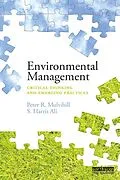Environmental Management offers a rigorous critique of conventional EM and explores alternative ideas, frameworks and approaches that are currently considered "fringe", but which have the potential to transform the practice of EM. This book goes beyond narrow definitions and considers questions regarding the purpose, roles, scope and potential of environmental management. EM is situated and contextualized within the evolving and expanding realm of environment and sustainability literature. The book argues that new approaches to EM need to be more flexible, imaginative and better equipped to address future environmental problems of a scale and severity previously unforeseen.
Autorentext
Peter R. Mulvihill is Professor in the Faculty of Environmental Studies, York University, Canada.
S. Harris Ali is Professor in the Faculty of Environmental Studies and the Graduate Program Director of Sociology, York University, Canada.
Zusammenfassung
The field of Environmental Management (EM) involves a broad and evolving repertoire of practices. The field originated around 1970 in response to new policy, regulation and public concern about environmental issues. EM has undergone many changes and improvements since then, progressing from a reactive, compliance-based focus toward, in leading cases, practices reflecting strong commitment to sustainability. And yet, EM remains, for the most part, ill-equipped to deal with the complex and highly uncertain implications of the ecological crisis. Environmental Management offers a rigorous critique of conventional EM and explores alternative ideas, frameworks and approaches that are currently considered "fringe", but which have the potential to transform the practice of EM. This book goes beyond narrow definitions and considers questions regarding the purpose, roles, scope and potential of environmental management. EM is situated and contextualized within the evolving and expanding realm of environment and sustainability literature. The book argues that new approaches to EM need to be more flexible, imaginative and better equipped to address future environmental problems of a scale and severity previously unforeseen. This book will be of great interest to students and scholars of environmental management, environmental planning, resource management, and environmental assessment.
Inhalt
- Introduction
- Context: Challenges Facing Environmental Management
- Drivers of Change: Key Forces Influencing New Directions in Environmental Management
- Conventional Environmental Management: Origins, Evolution, Characteristics and Critique
- Current State of Alternative Environmental Management: Theory, Practice, Limitations and Gaps
- Critical Social Science and the Ecological Crisis
- The Critical Analysis of Climate Change as a Case in Study
- Disaster Studies and the Ecological Crisis
- A Socio-Ecological Approach to the Ecological Crisis
- Towards a Philosophical Reorientation in Environmental Management I: Post-Normal Science Thinking
- Towards a Philosophical Reorientation in Environmental Management II: Black Swan Thinking
- Experimental Applications of Emerging, Alternative Environmental Management
- Conclusion and Prospects for Alternative Environmental Management
